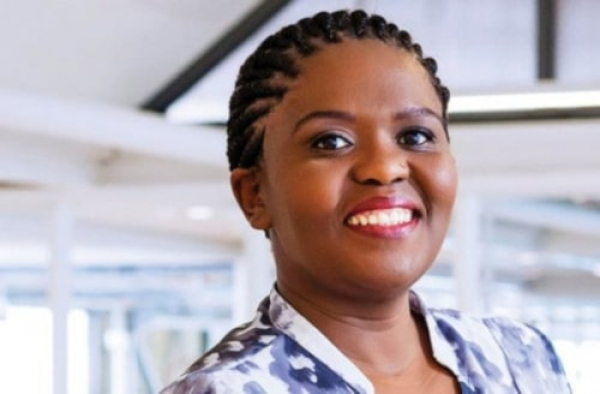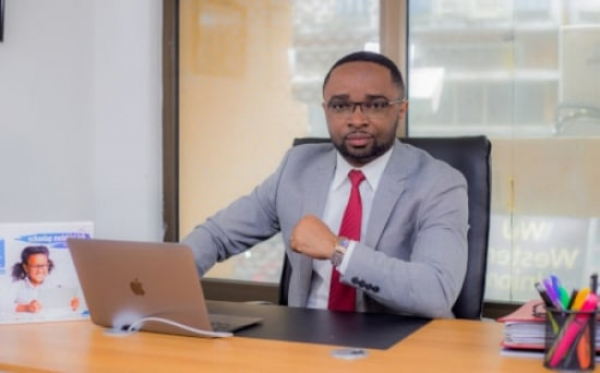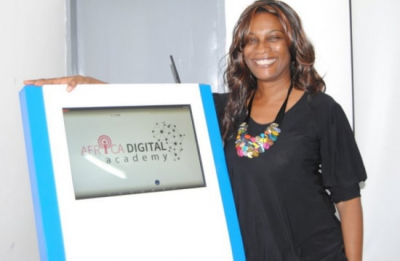
TECH STARS (1006)
For nearly 20 years, Baratang Miya (pictured) has been encouraging women and girls to step into STEM. In 2003, she founded GirlHype to pursue her vision.
The South African entrepreneur had the opportunity to strengthen her coding skills in Silicon Valley, in the U.S., after being selected by the TechWomen program. The idea for GirlHype was born out of Baratang Miya's personal experience. When she was a university student, she did not know about the Internet. Later, one of her acquaintances introduced her to the digital world. “It has changed my life to the level I could never have dreamed of. It has taken me to the policy level to speak at platforms like the United Nations. I’ve just come back from the UN, in December, speaking as one of the high-level panel members at the Internet Governance Forum,” she remembered.
GirlHype combines both theoretical courses and practical experiences in the field of computer science. The organization offers girls and young women the opportunity to participate, develop technical skills and social skills necessary to fully engage in the new 21st-century job market and higher education.
Baratang Miya’s mission is to address gender inequality in access to digital opportunities and skills. Her work has earned her partnership with international organizations, including UN Women, Mozilla, TechWomen, Silicon Cape, and Technovation. In December 2021, she attended the UN Internet Governance Forum where she shared her vision. "It is high time that the United Nations takes the initiative to ensure that no one is left behind, especially women and girls," she said.
African girls and women should be at the heart of global technology solutions that will be used by their communities, she believed. "We are committed to preparing each of our students to be problem solvers, collaborative leaders, and innovative entrepreneurs of tomorrow," she said.
Aïsha Moyouzame
Pascal Kanik is bringing the digital into schools in DR Congo with his startup Schoolap, a digital platform that provides students with access to digital lessons and transforms the way teachers teach in schools.
He created the startup in 2017 alongside another entrepreneur, Guy-José Leta. The idea of setting up this tool was born while he was on a work mission as a Vodacom employee to raise awareness about sustainable development in the country's provinces. “I realized the lack of quality learning in the areas I visited. I noticed that teachers don't know what sustainable development is. I then wondered how they could teach something they don't know,” he says. He then decided to bring quality lessons to them. Access to the digital platform is free and lessons can be downloaded to any device.
Schoolap also incorporates a tablet for those who wish to purchase it. The courses available meet the criteria and requirements of the Ministry of Education. "There are even courses in sign language for deaf and dumb people, and cartoons for kids," he adds.
Pascal Kanik won several international awards for his innovation and has even sold the concept to Seychelles. In April 2019, Schoolap won the award for best online education platform at Seedstars, a startup competition focused on emerging markets. That same year, the entrepreneur entered into a funding agreement with CFC, and subsequently raised $500,000 from the international Eutelsat Group, which accelerated his penetration of the Congolese market.
Schoolap has become increasingly successful with the lockdown imposed due to Covid-19. According to Pascal Kanik, the platform already has more than 20,300 educational content, a network of more than 6,000 schools, 1,900,000 students, and 105,000 teachers. The startup wants to reach 28,000 schools in the long term and conquer new markets.
Schoolap recently established an adapted bank loan with RawBank, the country's main bank, to enable the delivery of more than 10,000 tablets by the end of this year, much more than the 500 tablets sold monthly at the beginning of its marketing in 2021.
Aïsha Moyouzame
Moroccan Nizar Berdai (pictured), 25, is becoming a model of student entrepreneurship. He owns two startups: WeMash Digital, which specializes in digital transformation, and Wsselni Maak, which is a ride-sharing solution. This year, the young entrepreneur who is currently pursuing a master's degree in strategy and finance at Sciences Po Paris wants to focus on expanding his car-sharing solution.
Before becoming an entrepreneur, Nizar Berdai obtained a bachelor's degree in Salé, Morocco, then moved to Canada in 2015 to study finance and political science at HEC Montreal and McGill University. He was very active in the community and was a member of the Quebec Youth Parliament.
The idea to create a business came up to him while he was preparing for his master's degree at ESSEC Paris. He then created WeMash Digital, a startup specialized in communication consulting and digital transformation. Very quickly, he landed contracts with clients including Moroccan public sector organizations and NGOs such as Oxfam Morocco. At the same time, he refined a carpooling project and launched in February 2021, Wsselni Maak.
The student currently enrolled in a Master 2 in Finance and Strategy, at Sciences Po Paris, claimed Wsselni Maak receives an average of 450 offers and requests per day. In less than a year, the startup has more than 20,000 users in Rabat, Salé, Témara, Casablanca, Agadir, and Fez.
Nizar Berdai is now working to increase the service’s user base through partnerships with companies that will be announced, he says, in the coming days.
Aïsha Moyouzame
Arielle Kitio is taking a new step in her ambition to develop the digital skills of Cameroonians, particularly women and young people. On February 22, she launched the first edition of the Techwomen Factory initiative, designed to train 179 women in various technological skills including coding.
Founder of the Cameroon Youth School Tech Incubator (Caysti), the young tech entrepreneur has stood out in recent years through various initiatives aimed at developing digital skills among youth.
In 2018, she launched a fun coding educational program for children "ABC Code". The program teaches young people between the ages of 6 and 15 to create digital applications in African languages. Arielle Kitio also has other programs on her agenda, including one for high school teachers. Today, Caysti claims to have trained nearly 29,000 children in Cameroon, as well as 350 teachers and more than 8,000 primary education officials in more than 6 countries in Africa.
Arielle Kitio's initiatives have earned her several international recognitions. The pedagogical tools developed by her organization have been certified by the African Union in its 2018 Education Handbook and by Unesco ICT. She received the 2019 Margaret Award for African Digital Woman and won the global quality education competition organized by Deloitte in 2020. She is a former ambassador of the Next Einstein Forum in Cameroon and a holder of the Techwomen Award from the U.S. Department of State.
Arielle Kitio promotes the inclusion of women in the fields of science and technology. She has been leading this fight since 2015 through her association WIT (Information Technology for Women & Youth). The lady has a rich academic background. In 2011, she obtained a Bachelor's degree in computer science at the University of Yaoundé I, then a Master's degree in computer science with a Cloud Computing option in co-direction with the Institut National Polytechnique de Toulouse in France. She is currently preparing for a Ph.D. in Computer Science, Software Engineering at the University of Yaoundé I.
Ruben Tchounyabe
A former director of the McKinsey Global Institute and former advisor to Barack Obama, James Manyika is now the vice president of technology and society at Google.
As of January 2022, James Manyika (pictured) joined Google as its first-ever vice president of technology and society. This position makes the Zimbabwean responsible for assessing the impact of technology on society, the economy, and the world. Specifically, he helps shape Google's perspective on issues such as the future of work, AI, the digital economy, and IT infrastructure, among others.
“I’m thrilled that James Manyika will be joining Google’s leadership team [...] He’s spent decades working at the intersection of technology and society and has advised several businesses, academic institutions, and governments along the way,” Sundar Pichai. CEO of Alphabet (Google’s parent company) said in a statement. With this position, James Manyika will report directly to Sundar Pichai.
After a bachelor's degree in electrical engineering at the University of Zimbabwe, James Manyika was awarded the Rhodes Scholarship, allowing him to enter a University in England where he obtained a Ph.D. in AI and robotics, mathematics, and computer science. He joined the consulting firm McKinsey in 1994 and was appointed Director in 2009. He has advised many technology company leaders on strategy and growth, as well as business innovation.
The author of several books on AI and robotics, and most recently on global economic trends, was appointed by former US President Barack Obama as Vice-Chair of the Global Development Council at the White House, as well as by two US Secretaries of State to the Digital Economy Council and the National Innovation Council.
He also serves on the boards of research institutions at Harvard, MIT, Oxford, Sanford, and other leading universities. The introduction of James Manyika to the Google executive team comes in the wake of concerns about the impact of technology on societies worldwide. As a major player in the industry, the Silicon Valley-based company is directly concerned. With this mission comes enormous responsibility, and leveraging the vice president of technology and society’s experience should help Google better understand the issues surrounding the topic.
Aïsha Moyouzame
She is a pioneer in the webmaster industry in Congo. Her work earned her the nickname Mama Digital. And now, she is committed to putting digital technologies at the heart of Africa’s economic development.
Passionate about new technologies, Kriss Brochec is an expert in communication, management, and digital marketing. She made her debut on the Internet in the 2000s, thus becoming one of the pioneers of web mastering in Congo. Her mission: leveraging digital technologies to develop Congo’s economy. A Trainer, mentor, and entrepreneur, she also fights for women's rights and equality.
Kriss Brochec has a master's degree in international marketing and intercultural management and has professional experience in import-export where she has held important positions. However, after realizing that she was not cut for office life, she decided to devote herself entirely to the digital world. For the past 12 years, she has been passionate about CMS (Content Management System), especially WordPress, a content management system used for building websites.
She went on and founded the African Digital Academy, a space dedicated to digital training programs. The structure promotes the local production of digital platforms and content such as websites, mobile applications, MOOCs, white papers, and blogs, among others. Besides offering training, the academy creates special programs for target communities such as artists, entrepreneurs, women and youth, and farmers, to show them how they can benefit from digital technology.
With nearly 215 websites created and more than 240 people trained, Kriss Brochec does not intend to rest on her laurels. Beyond her various programs deployed in Congo and West Africa, she wants to bridge the digital divide across the continent, driven by the firm belief that the secret to success is to create your own market, dare to go where no one has gone before, and innovate.
Aïsha Moyouzame
Driven by her mission to spark the flame of innovation in women, Jessica Makosso birthed a network that promotes female talent. The Congolese native who lives in France hopes that her platform will become a reference for supporting women’s projects.
A business management graduate, Jessica Makosso (photo) began her professional career as a salesperson. After acquiring experience for over seven (7) years, she quit her job in 2016 and went to further her studies in France. There, she earned a master's degree in business unit management. While doing internships in the luxury fashion industry in Paris, she started bringing female talent to light.
Later, she founded the Association des Femmes Inspirantes (Association of Inspiring Women). This was a way for her to help advance female leadership. The association helps make women gain visibility through networking, turning their ideas into profitable businesses with a positive impact. One of the initiatives carried out by Association des Femmes Inspirantes is a program called “Saisis ta destinée” (Seize Your Destiny)". The latter fosters reflection on entrepreneurship from a female perspective and raises women’s awareness about the matter.
Besides her activities in France, Jessica Makosso would like to be active in African countries. In 2018, she organized the second edition of her “Seize Your Destiny” awareness program in Pointe-Noire, Congo. “Awareness activities will not be limited to Europe. They will also be carried out in Africa and since I’m Congolese it makes sense given that charity begins at home,” she explained.
Makosso’s successes helped her find several partners, including banks, energy companies, and international organizations. Her goal in the future is to make her association a key partner of women, helping them grow professionally and succeed as entrepreneurs.
Aïsha Moyouzame
In collaboration with Bertrand Dago and Terrence Kondou, Fabrice Koffi, MD of Dothan Group, has developed a simplified accounting application to revolutionize small businesses. The solution -Keiwa- has been successfully deployed in Côte d'Ivoire and is now targeting the entire continent.
Fabrice Koffi (pictured) holds a degree in accounting and has several years of experience in various consulting firms, as administrative and financial manager of Agritecno West Africa, and as partner and co-manager of Urim Thummim Conseil. With five years of experience in supporting Ivorian VSEs and SMEs, he decided to found his startup Dothan Group in 2017.
He teamed up with Bertrand Dago, a senior technician in electronic and computer systems, and Terrance Kondou, an engineer with a background in computer engineering, to create Keiwa. The solution is an accounting, financial management, and inventory management app that allows traders to manage their accounting easily.
The three young Ivorians share a common vision, which is to educate, support and empower informal sector entrepreneurs through simplified accounting.
The app was first launched in 2017 in Senegal before being rolled out in Côte d'Ivoire in 2020. It is designed to help African VSEs and SMEs track their daily operations, multi-site structures, as well as partners offering services to these companies. "The user can record his daily operations, manage his supply and have access to a clear activity report in real-time. Keiwa also enables remote monitoring of these activities and selective sharing of information with selected partners," according to information available on the Keiwa website.
In December 2017, the solution won the Coup de Cœur prize at the Societe Generale’s Pan-African Hackathon l'Arbre. Two years later, Keiwa was part of the second cohort of MTN Côte d'Ivoire's acceleration program, Y'ello Startup. In 2021, the startup joined the portfolio of I&P Acceleration Technologies, and benefits from financing and strategic support provided by the investment body and the team of Comoé Capital in Côte d'Ivoire.
Fabrice Koffi and his associates hope to make Keiwa a multinational company present in all countries of the African continent.
Aïsha Moyouzame
Congolese entrepreneur Dana Endundo Ferreira (pictured) has developed an online platform that serves as a melting pot for art lovers across the world. The platform, Pavillon 54, is presented as the “go-to platform for discovering, buying, selling and understanding Modern and Contemporary African Art.”
She has long worked in the financial sector but said: “I wanted to do something I was passionate about and where I could best utilize my skills.” Dana Endundo Ferreira has a Master's in Business Administration obtained in 2012 from Columbia University in the US. She then went on to specialize in digital strategies and digital marketing in US companies. In 2018, she moved to the UK, where she worked as a consultant for a fintech with business aspirations in Africa. With her background, she decided to do something she was passionate about.
The daughter of two art lovers wanted to create the first leading platform dedicated to the development of Africa's arts and culture, by Africans, for Africans, and the world. To achieve such a feat, she adopted a 3C strategy (commercial, content & community). The commercial aspect naturally involves the various purchases of African works. She then intends to offer educational content to fill the information gap on African art with a well-researched blog and other resources; and finally, she organizes events that help create a strong community where African cultures are shared and celebrated. To date, some 40 renowned artists are listed on Pavilion 54, where they exhibit a variety of works ranging from paintings, photographs, and sculptures that sell for $1,000 to $10,000.
While the numbers are promising, Dana Endundo Ferreira deplores the lack of financial support and infrastructure for the arts in Africa, despite the industry's strong international potential. “We will also soon dedicate a space on our platform to present and offer more visibility to young artists who do not have formal representation in galleries or other exhibition opportunities, but demonstrate great talent and potential," she said.
Aïsha Moyouzame
He is the founder of Insightiv, an AI and Teleradiology startup dedicated to improving medical imaging in Rwandan hospitals. The AI/ML engineer recently raised funds from the HealthTech Hub Africa and hopes to soon collaborate with Rwanda’s public health system.
In 2009, Audace Nakeshimana (picture) founded Insightiv, an AI and teleradiology startup. At the time, he was studying at the Massachusetts Institute of Technology (MIT) in the US. Besides being the founder and executive director of Insightiv, the Rwandan is also, since September 2020, a Machine Learning engineer at Apple. Setting up his business in Rwanda was motivated by the desire to involve local talent in technological development and his ambition to tackle African challenges.
Insightiv’s purpose is to provide easier access to medical imaging diagnostics. “Growing up, we heard stories about people who were sick and [didn’t] know what [they] had. Then that person [would come] home [and] they eventually die. It happens to a lot of people, especially in Africa - my grandma being one of them and actually one of my aunts. … If you really look at it, a lot of people die because of limited diagnostics,” Nakeshimana said.
Insightiv is developing advanced technology to help radiologists detect life-threatening diseases faster, by making medical imaging timely and accessible. The solution provides tools based on various image viewing modalities, giving medical imaging specialists access to a wide range of tools for better analysis. It allows them to create and submit reports using a single platform. As a cloud-based system, the Insightiv Diagnostics platform helps healthcare personnel focus on patient care rather than technical issues.
In 2020, Audace Nakeshimana was a finalist in the PKG Center's IDEAS Social Innovation Challenge, receiving $16,000 in funding. That same year, in December, he won the HealthTech Hub Africa competition and was awarded $30,000. The entrepreneur plans to use the funding to improve his service and reach out to legislators to collaborate with the public health system.
A decade from now, he plans to reach 10% of the Rwandan population with his rapid diagnostics solution.
"If you look today, the current health care system only has the capacity to diagnose about 200,000 to 300,000 patients [...] We think that if a private organization like Insightiv can take care of 10% of the population, that means we would be doing more than the national health care system is doing today. That's an ambitious, but realistic goal," the engineer claims.
Aïsha Moyouzame
More...
Cameroonian Emmanuel Assom’s (pictured) desire to migrate to Europe, nearly eight years ago, is now only a memory. The entrepreneur gave up on this dream to launch a healthcare solution that is already well adopted in his country. The health tech solution OuiCare was launched nearly six years ago. The promoter claimed that by the end of 2021, his solution had registered 3,000 customers, out of more than 20,000 users.
He developed OuiCare, basically as an e-health booklet, to replace the paper booklet and allow patients to always have their medical records available on smartphones or computers. This way, patients can be received in a health facility regardless of the city or country they are visiting. This idea came to him after his father died at a health center where he had gone without his medical records. Emmanuel says the doctors could have acted more quickly if they had had access to the file.
Before OuiCare was born, the entrepreneur, who studied computer maintenance, was a cleaner at a local company and a computer troubleshooter. At that time, he gathered enough money and moved to Europe where he started a business with some friends. In 2016, they founded ASTA (Advanced and Suitable Technologies for Africa), a web and mobile app development company for businesses and individuals. He later on created OuiCare.
Today, after several improvements, OuiCare is now composed of two platforms. The first, for patients, allows them to access doctors, teleconsultation, and their medical data. The second, for doctors only, allows them to monitor patients and manage their treatment. The startup, based in Yaoundé and Douala, is working to integrate other features such as the geolocation of pharmacies.
In 2021, Emmanuel Assom won the Orange Prize for Social Entrepreneur in Africa and the Middle East (POESAM). The healthtech company received €25,000 and support from local incubator ActivSpaces and French Bond'innov. OuiCare has also joined the Cameroon digital innovation center (CDIC), the new incubator launched on February 8, 2022, by the government. With some thirty doctors already registered, the startup hopes to extend its services to all regions of Cameroon and then to other African countries, such as Senegal, where administrative procedures have already been initiated.
Ruben Tchounyabe
In 2019, Alexis Bafcop and Géraud Lacaze, two Orange engineers, launched a solution in Abidjan, Côte d’Ivoire, to effectively meet the growing demand for online shopping delivery.
Named Mahali, the solution was presented during the 3rd edition of the Abidjan e-commerce Days in December 2019. It is a mobile geo-tracking app that allows a seller and a buyer to agree on a geolocated point of delivery, in a country where addressing is still weak. The tool integrates a database of locations fed in part by users themselves, who can fill in their address by indicating the city, the neighborhood, and landmarks with photos. The delivery man receives a code that, once registered on Mahali, allows him to access the necessary information and to propose a delivery time to the buyer. The solution enables buyers to pay via mobile.
"The team studied how people locate and describe a place in the region. We interviewed people in e-commerce warehouses, deliverymen, buyers, startup creators, etc., to understand the reality and the challenges they face," says Alexis Bafcop. The addresses created in Mahali can also be shared for other purposes, such as emergency services or to direct visitors.
The project benefited from the support and guidance of Orange's intrapreneurship body -Intrapreneurs Studio. Mahali also relies on the expertise of Orange entities such as Orange Labs Services, XDLAB (UX design), and receives great support from Orange Côte d'Ivoire teams: Orange Money, Enterprise Services, Customer Test Center and data scientists.
A year ago, Alexis Bafcop explained that "users are the ones who create the value of the app. So it's free. The more the delivery landmarks are used, the more reliable they will be. In two years, when the database is sufficiently reliable and complete, merchants will be the most likely to pay for the service.” The app will soon be launched in other countries including Senegal and Cameroon, the founders said.
Ruben Tchounyabe
Africa has the lowest per capita car ownership in the world, due to limited access to finance for vehicle purchases. This is a problem that Ladi Delano and Jide Odunsi hope to solve with their start-up Moove Africa.
Ladi Delano (photo, right) and Jide Odunsi (photo, left), are two UK-based Nigerian entrepreneurs who want to democratize mobility in Africa through new technologies. They founded Moove Africa, a start-up offering a digital platform where users and entrepreneurs in the transport sector have access to loan options for the purchase of vehicles. From the London School of Economics to Oxford University to MIT, the entrepreneurial duo has a remarkable academic background.
Ladi Delano, a serial entrepreneur, and Jide Odunsi, a former investment banker at Goldman Sachs and a former management consultant at McKinsey, have a combined 8 years of entrepreneurial experience, with three start-ups launched including Moove Africa. Sharing a passion for African development, they decided to dedicate their experience to this goal.
They officially launched Moove Africa in July 2020 after realizing that the demand for vehicles in Africa far exceeds local production, leaving millions of individuals and businesses to depend on imports of used cars, cars that are mostly not in a good condition. Also, some countries, like Nigeria, have put in place measures that limit car imports to boost local manufacturing. These measures make it even more difficult for Africans to get cars.
Moove Africa was therefore born to help people get access to quality vehicles. The start-up has an app where users can secure loans to buy a car. The loans can be repaid over 30, 36, or 48 months, in weekly installments. To date, Moove-financed cars have made over 2.6 million trips and traveled over 30 million kilometers in six markets, namely Lagos, Accra, Johannesburg, Cape Town, Nairobi, and Ibadan.
In less than two years since they launched the start-up, Ladi Delano and Jide Odunsi have successfully raised $78 million from investors, including $10 million in their latest round. The funds were secured on February 1, from NBK Capital Partners.
"The investment…will fuel our continued growth trajectory as we expand our regional operations to empower more mobility entrepreneurs," said Ladi Delano, co-founder, and CEO of Moove Africa.
On February 10, Moove Africa's founders announced a partnership with CFAO Motors, a division of CFAO Automotive, which operates in 36 countries. "We’re especially proud to be working alongside the largest automotive distribution network in Africa and as a result of this, we’re now in an even stronger position to empower a new generation of successful and productive mobility entrepreneurs,” said Ladi Delano.
Aïsha Moyouzame
WattNow has gained popularity among individuals and companies over the past four years. This has earned the company participation in many international events and the interest of new investors.
To tackle the waste of energy in Tunisia and help households keep their electricity bills low, Issam Smaali (pictured) developed and launched, in 2017, his startup WattNow. Using IoT (Internet of Things) and digital tools, WattNow enables consumers to monitor, analyze and adjust the consumption of their electrical appliances in real-time.
The solution works with a smart meter. It integrates a machine learning system to analyze consumption. Collected data is sent to the startup's cloud where they are analyzed with algorithms and the results are sent to consumers either via a mobile app or a dedicated web interface. Based on the result, the user can directly give orders to the box and reduce their consumption.
Users can download the app from App Store and Play Store and set it up with the smart meter. The WattNow app displays real-time energy consumption both throughout the house, but also for each device that turns on or off. It also delivers a daily, weekly, or monthly history of the electricity consumption of the home or business. Alerts are sent to users when a device stays on or consumes too much energy.
With WattNow, Issam Smaali seeks to lower electricity bills for Tunisians by up to 30%. Highly appreciated for its social impact, the service has already been adopted by several households and large companies such as Orange Tunisia. The latter installed it in 2018 on several of its telecom sites and administrative buildings.
The solution was incubated at Flat6Labs and began its consolidation and development thanks to a $20,000 prize won in 2017 at the “BloomMasters” entrepreneurship competition. Another award worth $100,000 was obtained from the Oman Technology Funds. In 2019, WattNow benefited from the supervision of the Orange Fab Tunisie accelerator and participated at VivaTech 2019. In 2021, the startup participated in several tech events, including the annual GITEX GLOBAL technology fair in Dubai, and raised several thousands of dollars from several investors such as the venture capital fund Katapult or even Bridging Angels.
Ruben Tchounyabe















